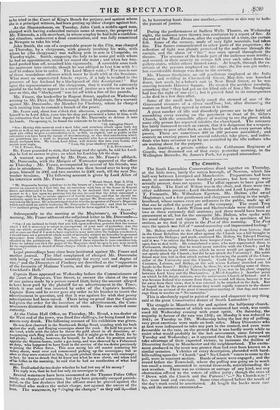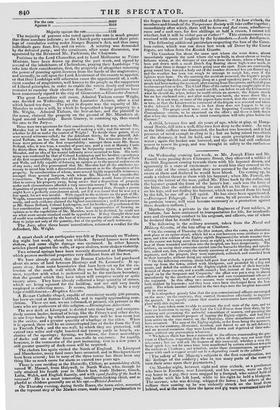Cnuntrp.
The South Lancashire Conservatives dined together on Thursday, at the little town, lately the rotten borough, of Newton, which lies half-way between Liverpool and Manchester: Preparations had been made to accommodate seven hundred persons; but how many were actually present, does not appear. The affair appears pears to have gone off very flatly. The Earl of Wilton was in the chair, and there were two other noblemen present—Lord Skelmersdale and Lord Lyndsay. Sir T. Fremantle, Mr. Wilbraham Egerton, Mr. Hulton (the noted Magistrate), and a few gentlemen and clergymen residing in the neigh- bourhood, whose names even are unknown to the public, made up all that can be called the genteel part of the company. The usual Tory toasts were given ; Lords Wilton and Skelmersdale were delivered of two or three extremely dull orations; and there would have been no amusement at all, but for the energetic Mr. Hulton, who spoke with his usual elegance and vigour. The following is a specimen of his oration, as we find it given in the Post of this morning. The Post says the speech was full of " sound reasoning and impassioned feeling."
Mr. Halton referred to the Church, and said, speaking from history, that in the Great Rebellion the first effort against the Church was a hill brought in to remove the Bishops ; and mark, continued Mr. Balton, Sir Edward Deering said it was "to relieve the Bishops from temporal care." They had secret and open foes to deal with. He remembered a man, who now represented them in Parliament, declaring that he would never interfere with the Church ; and by that declaration he got 10(X) votes, which he never would get again. He did not openly attack the Church ; but did lie not attack the University? His noble friend near him had in that attack assisted in throwing the mantle of the Chan- cellor of the University over the Church. Could they forget the names of Cranmer, Latimer, and Ridley., or the soil where Latimer stretched out his hands iu the flames ? Ridley's ghost, he thought, was troubling some of them.
Ridley, who was educated at Newca•tle-upon-Tyne, was in his ghost stepping
between Lord Grey and the Durhamites. (31t,e/t laughter.) Another point on which he felt deeply anxious, was the unfortunate Church of Ireland and it
was because Ireland was remote from them, he would tell them, because it was far away from their view, that it was selected to be attacked in the dark. But he hoped that by the power of steam they would rapidly transmit to the shores of Ireland an account of the great Conservative meeting of that day, and encou- rage them to resolve on "No surrender."
This is absolutely equal in point of sense and eloquence to any thing said at the great Conservative dinner of South Lancashire !
The struggle in Manchester for and against the halfpenny church- rate, the commencement of which was mentioned last week, was conti- nued till Wednesday evening with great spirit. On Saturday, the majority in favour of the rate was 1102 ; on Monday it was reduced to 1045; on Tuesday to 739. Wednesday being the last day of polling, very great exertions were made on both sides. Many Dissenters who at first were indisposed to take any part in the contest, and even were favourable to the rate, on the ground that it was hardly worth while to resist what would probably be the last assessment, came forward on Tuesday and Wednesday; as it appeared that the Church party would take advantage of their expected victory, to insinuate the decline of Dissenting feeling in Manchester and the neighbourhood. The excite- ment produced in the town was greater than had ever been known on a similar occasion. Vehicles of every description, placarded with hand- bills calling upon the " Church " and " No Church" voters to come to the
i poll, were in constant motion. Bands of music were engaged ; and the crowd before the Town-hall, where the polling was going on in much too small a room, amounted to several thousands, notwithstanding the wet weather. There was no violence or outrage of any kind, nor any obstruction offered to the voters of either party ; though the cries of " Down with the Church and the Parsons ! "—" No Church-rate ! " 8:e. were loud and constant. Seine time elapsed before the result of the day's work could be ascertained. At length the books were cast up, and the numbers announced- Por the rate •• 5897 Against it 7019
Majority against the rate
1122
The majority of persons who voted against the rate is much greater than these numbers indicate ; as the Church party exercised their privi- lege of cumulative voting under Sturges Bourne's Act, and thus many individuals gave four, five, and six votes. A scrutiny was demanded by the defeated party ; and the scrutineer, after some discussion, was appointed by the Reverend Mr. Parkinson, the Chairman.
Petitions to the Lord Chancellor, and to Lord Melbourne as Prime Minister, have been drawn up during the past week, and signed by
several of the inhabitants of Cheltenham, praying their Lordships "to take into their consideration, first, the propriety of altogether removing the power of granting spirit-licences from the hands of the magistrates ; and secondly, to call upon the Lord-Lieutenant of the county to appoint, or that their Lordships will otherwise cause the appointment of, a suffi- cient number of magistrates, well known to the people as the supporters of Liberal principles, in order to enable the voters freely and without restraint to exercise their elective franchise." Similar petitions have been numerously signed in the city of Gloucester.—Gloucester Journal.
The great Lancashire will cause, Admiral Tatham versus Wright. was decided on Wednesday, at the Lancaster Assizes, after a trial which lasted ten days. The point in dispute was the capacity of Mr. Marsden to make a will, by which he bequeathed a large property to a Mr. Wright. Admiral Tatham, the heir-at-law, and the plaintiff in the cause, claimed the property on the ground of Mr. Marsden's al- leged meatal imbecility. Baron Gurney, in summing up, thus stated the case to the Jury— There were two questions for their consideration ; the first was, whether Mr. Marsden had or had not the capacity of making a will ; and the second was, whether be did so under the control of Wright ? To decide these points, there were several witnesses called ; for the defendant thirty, for the plaintiff, Ad- miral Tatham, no less than one hundred and ten. The witnesses for the de- fence were persons of the first respectability : amongst them were Mr. Baron Holland, who, it was true, a number of years ago, paid a visit at Hornby Castle for thirty-three days, during which time he frequently conversed with Mr. Marsden, and an idea of his mental infirmity never occurred to him. His testi- mony was confirmed by that of Colonel Lushington and his brother—gentlemen of the first respectability, nephews of the Bishop of Chester, now Bishop of Bath and Wells, and fully capable of forming an opinion as to the mental endowments of any man; and they pronounced that Mr. Marsden had all the attributes ne- cessary to invest him with a discretional discernment as to the disposition of his property. In corroboration of whom, were several highly respectable witnesses ; amongst them several lawyers, with whom Mr. Marsden had considerable transactions. Was it possible that all these gentlemen would have allowed an idiot to convey his property away, being aware that a disposition of property under such circumstances afforded a very uncertain tenure ? With regard to the disposition of property under restraint, it must be proved that, though a person might have a perfectly convalescent mind, yet if it was found that he was not a free agent, his act was invalid. With regard to the evidence on the part of Mr. Wright, numerous respectable and intelligent persons deposed to Mr. Marsden's sanity, and such evidence claimed the highest consideration ; and if such persons as Mr. Baron Holland, Colonel Lushington, and his brother, all gentlemen of the first consideration and respectability, who had opportunities of forming an opinion as to the capabilities of Mr. Marsden, were to be doubted, he could not see what more secure standard could be appealed to. If they thought their test of credit was outbalanced by the host of witnesses on the other side, it was their duty to judge not only of the quantity, but of the quality of such testimony.
The Jury, after three hours' consultation, returned a verdict for the defendant, Mr. Wright.

















 Previous page
Previous page